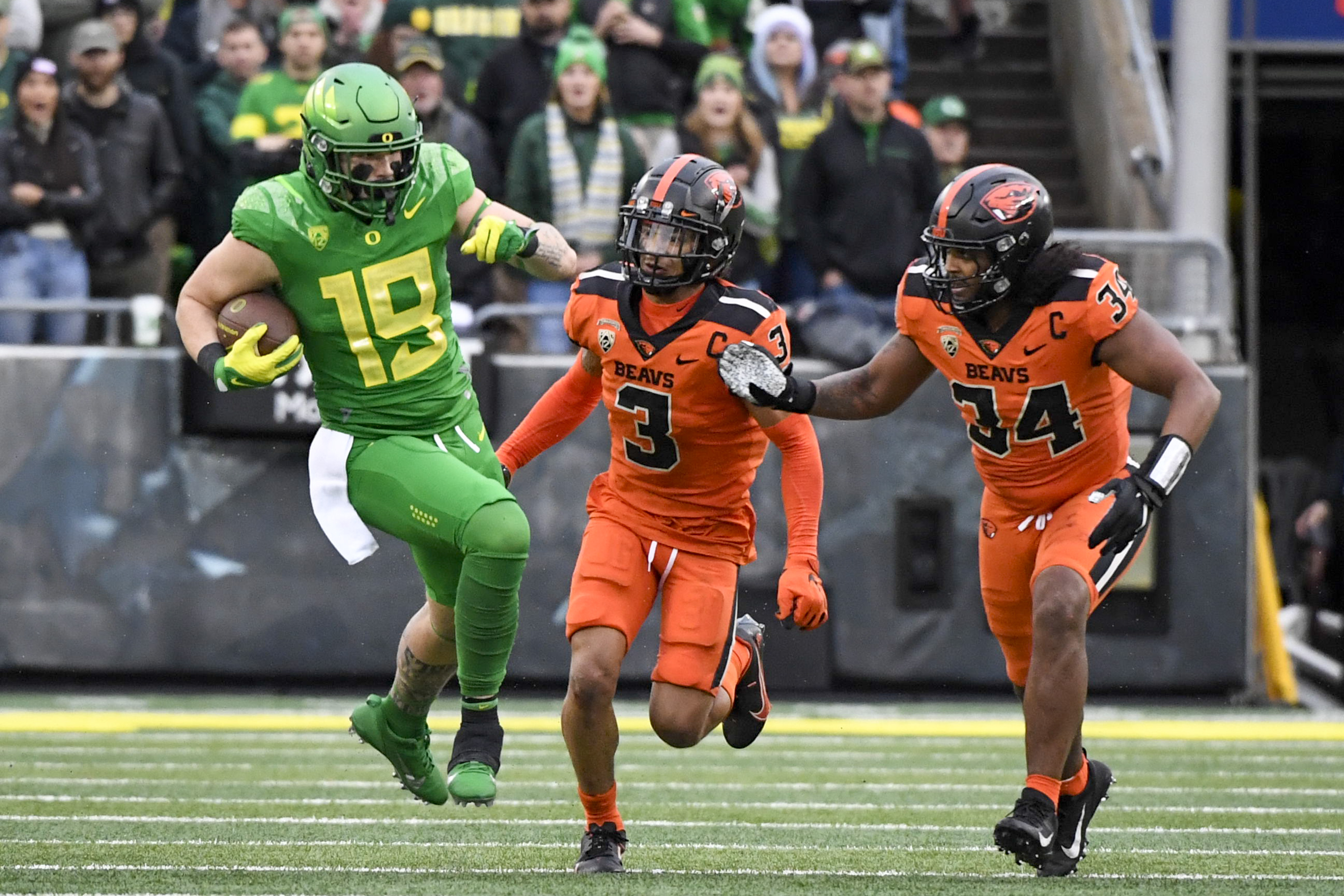
Oregon State University cornerback Jaydon Grant (3), shown in this 2021 file photo, is among several athletes in the state with potential deals in the works to earn a profit from their name, image or likeness. Oregon lawmakers are considering a bill that would clear hurdles for that to happen.
Andy Nelson / AP
A bill further allowing Oregon’s collegiate student athletes to profit from their name, image and likeness crossed the halfway point to becoming law Wednesday.
Senate Bill 1505 would allow athletes such as 6-foot-7-inch University of Oregon forward Sedona Prince and Oregon State University cornerback Jaydon Grant to earn royalties from jersey sales, trading cards and video games that profit off them. Prince and Grant are among a number of student-athletes with name, image or likeness deals hanging in the balance, as legislators debate SB 1505.
The bill passed unanimously out of the Senate and now heads to the House for consideration and approval.
It follows up on work lawmakers completed last year which broke a more than 100-year tradition of amateurism precluding college athletes from earning money.
Senate President Peter Courtney, D-Salem, shepherded that effort through the legislature last year and it took effect on July 1, 2021. It was the first step for Oregon in a nationwide effort to give athletes a cut of the billion-dollar college sports industry.
But intervention by the National College Athletics Association (NCAA) prevented Courtney from going as far as he would’ve liked.
“All of the language that’s here was in (last year’s bill),” Courtney said on the Senate Floor Wednesday. “Until the president of the NCAA found out about it and demanded an audience with me.”
NCAA President Mark Emmert threatened Courtney that if the Oregon Legislature passed a bill with specific language giving royalties to college athletes, the NCAA would disqualify every student-athlete in the state.
Ultimately the royalties piece was cut from SB 5 and lawmakers approved it on wide margins in both chambers, last year.
Seven months later, the NCAA is singing a different tune following passage of name, image and likeness bills in 27 other states.
Now, Oregon is poised to join Pennsylvania as the only states to pass bills taking the process one step further by allowing collegiate athletes to earn royalties for jersey sales, trading cards and video games.
If passed, the bill could provide some much needed support to athletes who often don’t come from money. Supporters say athletes want to be able to help their parents pay the bills back home, purchase gifts for family during the holidays or simply have some extra cash in their pockets.
It could also give two Division I schools — the Oregon Ducks and Oregon State Beavers — a major leg up in terms of recruiting top tier athletes looking to land somewhere they can participate in the business of college athletics.
Courtney said Wednesday that these name, image, likeness deals aren’t just benefitting the star athletes in “revenue generating” sports such as football or basketball. All athletes, from acrobatics and tumbling to golf, have the opportunity to cash in.
More than 300 UO and OSU collegiate athletes have inked deals, the majority of which were for female and non-football athletes.
A handful of UO alumni including Nike mega donor Phil Knight have even started a new company aimed at helping student-athletes with branding and marketing as they take advantage of the new system. But reports say the NCAA is looking into a handful of programs including UO for potential violations.
During Wednesday’s Senate floor session, a handful of Courtney’s colleagues, including Senate Republican Leader Tim Knopp of Bend, stood to speak in favor of the bill.
Sen. James Manning, Jr. — a Eugene Democrat — emphasized that allowing student-athletes to earn money has huge benefits for those who come from poverty and their families.
“They go into schools under the guise of a scholarship, and they work, they bleed and they give everything they can, making billions for network television, for schools, for coaches, and yet most of them cannot even afford food at night,” he said. “This is another step to get us closer to compensation whereas they’ve been victimized for years and years.”
Manning said he has aspirations to take the conversation even further by looking at laws which would make student-athletes employees of the universities they compete for, a step that would afford them more rights and benefits under labor law.
The bill is now awaiting assignment to a House committee where it’s expected to be considered in the next several days.
Lawmakers have until March 7 to conclude the business of the 2022 legislative session.


